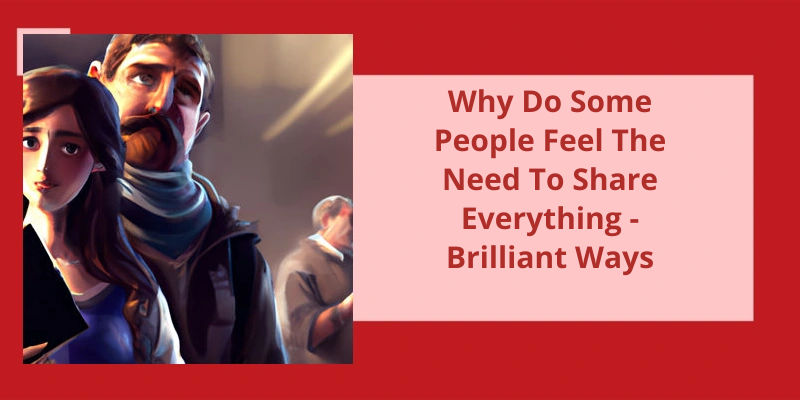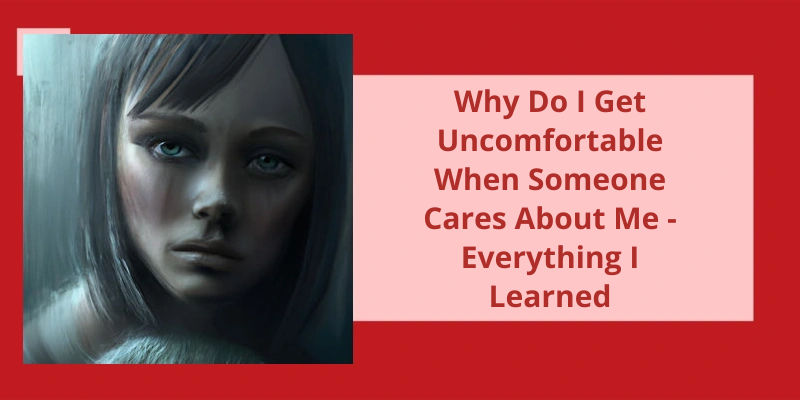In today's hyperconnected digital age, it’s become increasingly common for individuals to feel an incessant urge to share every aspect of their lives. Whether it's through social media platforms, personal blogs, or even in everyday conversations, some people find a compelling need to disclose every detail, no matter how trivial or mundane. While there may not be a single, definitive answer to this complex behavior, it’s evident that various psychological, sociological, and cultural factors contribute to this pervasive need for self-disclosure. By delving into these intricate realms, we can uncover the brilliant ways in which this inclination to share manifests, providing us with deeper insights into human nature and the complexities of modern communication.
Why Do I Feel the Need to Share All My Thoughts?
Why do I feel the need to share all my thoughts? Why do many people want to share their feelings with others? Perhaps it’s in our nature to seek validation and connection from those around us. Sharing our thoughts and emotions allows us to feel understood and supported. It helps to slow down the processing of the information that’s originally arrived in a huge rush and overwhelmed your emotions and brain. By sharing, we externalize our thoughts and create space for reflection and introspection.
Moreover, sharing our thoughts can also be a way to gain new perspectives and insights. Sometimes, we may not be able to see the bigger picture or find clarity on our own, but by opening up to others, we invite their thoughts and experiences into our lives. This exchange of ideas can lead to personal growth and expanded understanding.
Additionally, the act of sharing can also be cathartic. When we express our feelings, we release pent-up emotions and find relief. It provides an outlet for the thoughts and emotions that may otherwise become overwhelming. By giving voice to our innermost thoughts, we can gain a sense of release and freedom.
When we open up and share vulnerably, we give permission for others to do the same. This creates a safe space for authentic conversations and deepens our relationships. It reminds us that we aren’t alone in our experiences and that we’ve a support network to rely on.
By articulating our ideas and feelings, we gain clarity and a deeper understanding of ourselves. In sharing, we invite feedback and alternative perspectives, which can challenge our thinking and lead to personal development.
It helps us process overwhelming emotions, gain new perspectives, find catharsis, foster empathy, and deepen self-awareness. Sharing isn’t only a way to express ourselves but also a means to navigate through the complexities of life with the support and insight of others.
Humans are inherently social creatures, driven by a deep-seated desire to share experiences with others. This inclination stems from our innate need to feel connected and supported, especially during moments of joy or hardship. Whether it’s celebrating victories or seeking solace in times of adversity, sharing our experiences not only helps us navigate life’s ups and downs, but also strengthens our sense of belonging within a community.
Why Do You Think We Feel So Compelled to Share Our Experiences With Others?
Why do you think we feel so compelled to share our experiences with others? As social creatures, people tend to want to experience good times—and get through the tough times—in the presence of others, since it makes us feel more connected . Whenever something significant happens in our lives, whether it’s a promotion, a new relationship, or even a small accomplishment, we naturally want to share it with others. By sharing these experiences, we seek validation, recognition, and support from our social circle, boosting our self-esteem and reinforcing our sense of belonging.
In a society where social media platforms dominate our lives, the need to share has become even more prevalent. These platforms provide an audience of friends, family, and even strangers who can instantly interact with our posts, pouring in their reactions, comments, and support. The instant gratification we receive from these platforms fuels our desire to continue sharing. It taps into our innate need for affirmation and social validation, offering a sense of importance and attention that can be addictive.
Additionally, sharing our experiences can also serve as a way to document and preserve memories. Whether it’s through photos, videos, or written narratives, sharing allows us to create a digital footprint of our lives that can be revisited and cherished in the future. It becomes a way to keep a record of our personal growth, milestones, and adventures, allowing us to reflect on our journey and reminisce about the past.
Lastly, the act of sharing allows us to connect with others on a deeper level. It opens up conversations, encourages empathy, and builds bridges between people who may have different perspectives or backgrounds. It promotes understanding, encourages dialogue, and allows us to learn from each other. By sharing our experiences, we tear down the walls of isolation and create opportunities for genuine connection and growth.
Whether it’s their deepest secrets, daily struggles, or simply their thoughts and emotions, extroverts are known for their willingness to share everything with others. These individuals seek solace in those who offer a patient ear, going above and beyond to unload their burdens and find solace in human connection. However, there’s more to their openness than meets the eye, as extroverts derive immense satisfaction from the act of sharing, forming meaningful bonds, and relishing the comfort of reciprocal vulnerability.
What Do We Call a Person Who We Can Share Everything?
They feel the need to share everything as it serves as a therapeutic release for them. By opening up and discussing their thoughts, emotions, and experiences, they feel a sense of relief and validation. Sharing everything also allows them to connect with others on a deeper level, fostering stronger relationships and creating a support system.
Extroverts are highly social individuals who thrive on interaction and external stimulation. They often gravitate towards group settings and enjoy being the center of attention. For them, sharing everything comes naturally as they enjoy expressing themselves and being heard. They find solace in knowing that there are others who’re willing to listen and provide support.
Furthermore, sharing everything can be seen as a way for extroverts to seek external validation. By sharing their experiences, thoughts, and emotions, they hope to receive feedback and reassurance from others. This validation boosts their self-esteem and provides a sense of affirmation.
However, it’s important to note that not all extroverts share everything. There’s a spectrum of extroversion, and some individuals may have more reserved tendencies. Additionally, not everyone feels the same compulsion to share everything, as personality traits and individual preferences vary. Remember that everyone has their unique way of navigating social interactions and connections.
The Benefits and Drawbacks of Sharing Everything With Others
Sharing everything with others can have both benefits and drawbacks. One benefit is that sharing allows us to connect with others, build relationships, and foster a sense of community. When we share our thoughts, experiences, and emotions, we often find that others can relate to us, offer support, and provide valuable insights. Additionally, sharing can help us feel heard and understood, reducing feelings of loneliness or isolation.
However, there are also drawbacks to sharing everything. Oversharing can lead to a lack of privacy and boundaries, as we expose personal information that may be better kept private. Moreover, constantly sharing can be draining, as it requires emotional and mental energy to constantly update others on our lives and respond to their reactions. In some cases, oversharing can also lead to misunderstandings or unintentional harm, as our words or actions may be taken out of context or misconstrued by others.
It’s important to find a balance when it comes to sharing. We should consider what information is appropriate to share and with whom, while also being mindful of our own well-being and the impact our sharing may have on others. By being selective in our sharing and setting boundaries, we can navigate the benefits and drawbacks of sharing everything in a healthier and more meaningful way.
Source: What’s the difference between a person who shares … – Quora
Conclusion
In conclusion, the compulsion to share every aspect of our lives can be driven by various factors. While the desire for attention and validation may play a role, it’s crucial to recognize that social media platforms have transformed the way we communicate and connect with others. This constant need for sharing may also stem from a need for connection, self-expression, or simply the evolving norms of the digital age. However, it’s important to strike a balance and consider the potential consequences and impact of oversharing on our well-being, relationships, and privacy. Finding brilliant ways to navigate the digital landscape and reflect on our motivations can lead to a healthier relationship with sharing, allowing us to cultivate authentic connections and enrich our lives both online and offline.






